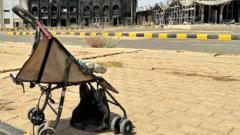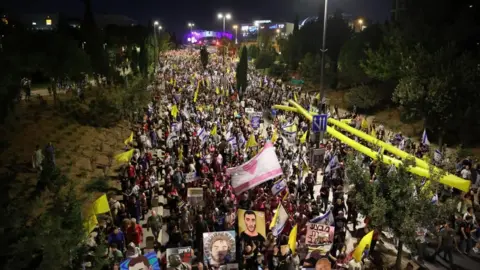The haunting silence of Khartoum tells a story of relentless battles and profound loss while indicating a flicker of hope within its battered streets. After the Sudanese army reclaimed the capital from the paramilitary Rapid Support Forces (RSF), the city is in ruins, having endured intense urban combat over the past two years. As we made our way through the once-bustling heart of this important city, it became evident that rebuilding will be a daunting task.
The destruction was most visible at the presidential palace, which served as a key stronghold for the RSF. It now lies ravaged, with evidence of looting and violence filled with broken glass and debris. Once proud rooms show signs of life that was, now overshadowed by the grim remnants of conflict. “It symbolizes our dignity,” one soldier remarked about the palace, highlighting the pride felt in reclaiming this emblem of power.
Though the military celebrates, the cost of this "victory" is harrowing: Khartoum’s central district is filled with burnt government buildings, charred offices, and a forsaken airport littered with damaged planes. As we drove carefully, evidence of the conflict was stark, with human remains and unexploded ordnance a grim reminder of the violence that has plagued this city.
Yet, amidst the devastation, glimmers of hope emerged as people welcomed the Eid celebrations. Many in Khartoum, having endured unimaginable hardships, chose to dress festively, sharing moments of joy and relief at the end of the brutal RSF’s hold over the city. “It’s our first Eid in two years,” said one local, capturing the emotional weight of this fleeting return to normalcy.
The mood was buoyant at community kitchens, which have become lifelines during the turmoil. Activist Duaa Tariq expressed joy and nostalgia as she reflected on the shifting realities post-war. However, echoes of uncertainty linger despite the flickering resilience among the people, as questions arose about the future of civil society and the risks that lay ahead.
Though there is talk of rebuilding and attracting international investors, the scars on the city's heart are deep, with the psychological impact of war weighing heavily on its citizens. Many seek not just physical recovery but also emotional healing, resonating with sentiments such as needing better support for traumatized children.
As hopes of reconstruction surface amidst the rubble, the cry for unity and support remains paramount, as expressed by young voices hoping for peace in regions still engulfed in conflict. Khartoum’s story refuses to end in despair; its residents are longing for healing, freedom, and a brighter tomorrow.


















